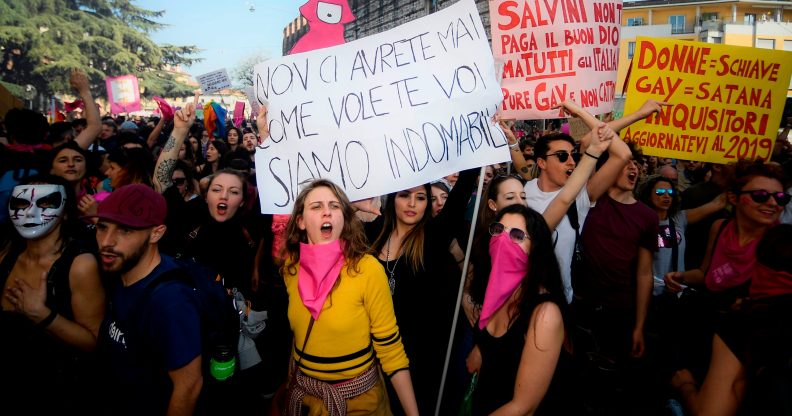Italy opens historic debate on long-awaited bill to outlaw LGBT+ hate crime despite far-right protests

Protesters defending LGBT+ rights at the World Congress of Families conference on March 30, 2019 hold a sign reading: ‘You will never have it the way you want, we are untamable’ (Filippp Monteforte/AFP/Getty)
Italy has been divided by debate over the country’s first law that would punish discrimination and hate crimes against LGBT+ people.
The proposed legislation would bring Italy in line with its western European counterparts by explicitly recognising discrimination against LGBT+ people as well as women.
As lawmakers begin debating the draft in parliament on Monday (July 27), the bill is already being virulently opposed by far-right parties and religious groups.
On July 16 politicians from the right-wing populist Lega party joined hundreds of Catholics protesting at Rome’s Piazza Montecitorio, insisting that the bill was a threat to their freedom of speech.
They carried banners with the slogan “Establishing a new crime is not needed and is wrong”, but countless LGBT+ Italians beg to differ.
“We need this law,” said Marco, a gay man who spoke to The Guardian ahead of the parliamentary debate. He and his boyfriend have been repeatedly harassed by a neighbour who forced his way into his home, called them “dirty faggots” and threatened to torch their car.
“My boyfriend managed to get rid of him but he returned with a baton and threw himself against the door, repeating the same insults and threatening to set us alight when we were asleep,” he said.
His pleas to police have been ignored, despite the recorded evidence on his mobile phone, and he’s seen the same inaction from police when a gay friend of his was similarly harassed.
“Twice the police came, and twice they did nothing,” he said.
Italy currently punishes hate crimes for racial, ethnic and religious reasons, as well as neo-Nazi and neo-Fascist actions and slogans. But the law still doesn’t recognise attacks based on gender identity or sexual orientation as hate crimes.
The push for legislative change was sparked by a spate of violence against the LGBT+ community, including a brutal attack by a gang of seven on a young man who was walking hand-in-hand with his boyfriend in Pescara.
The victim was beaten so badly that his jaw was smashed and had to be surgically reconstructed with titanium.
“After what happened, no one in the LGBT community feels able to walk freely,” one gay man told the FT. “The sense is that there could be aggression at any time. Everyone feels threatened.”
A recent Eurobarometer survey showed that LGBT+ acceptance in Italy was well below the European average. Only 55 per cent of Italians stated they would feel comfortable with a LGB person in the country’s highest elected office, compared to 90 per cent of people in Sweden and 93 per cent in the Netherlands.
Alessandro Zan, the centre-left MP who has championed the law change, said there was an urgent need for Italy to align itself with other European countries.
“Homophobia is widespread across the country — even if it’s often hidden. It emerges every time gay, lesbian and transgender men and women try to live openly,” he told the FT.
Monica Cirinnà, a senator from the centre-left Democratic party, added that the debate over the proposed law highlights the conservatism “ingrained” in Italian society.
“Italy has been reluctant to embrace diversity because people are pigeonholed in gender stereotypes due to a mixture of deeply rooted patriarchal and Catholic culture,” she told the paper.
“When you don’t fit into one of these stereotypes, you’re to be feared or kept away. But it’s time to move on,” she said.

